Related Research Articles

Jean Maurice Eugène Clément Cocteau was a French poet, playwright, novelist, designer, film director, visual artist and critic. He was one of the foremost artists of the surrealist, avant-garde, and Dadaist movements and an influential figure in early 20th century art. The National Observer suggested that, "of the artistic generation whose daring gave birth to Twentieth Century Art, Cocteau came closest to being a Renaissance man.".

Kurt Ferdinand Friedrich Hermann von Schleicher was a German general and the penultimate chancellor of Germany during the Weimar Republic. A rival for power with Adolf Hitler, Schleicher was murdered by Hitler's SS during the Night of the Long Knives in 1934.
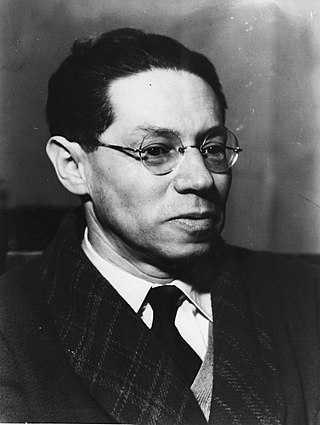
Lion Feuchtwanger was a German Jewish novelist and playwright. A prominent figure in the literary world of Weimar Germany, he influenced contemporaries including playwright Bertolt Brecht.

Edgar Morin is a French philosopher and sociologist of the theory of information who has been recognized for his work on complexity and "complex thought", and for his scholarly contributions to such diverse fields as media studies, politics, sociology, visual anthropology, ecology, education, and systems biology. As he explains: He holds two bachelors: one in history and geography and one in law. He never did a Ph.D. Though less well known in the anglophone world due to the limited availability of English translations of his over 60 books, Morin is renowned in the French-speaking world, Europe, and Latin America.

Gaston Ghrenassia , known by his stage name Enrico Macias, is a French singer, songwriter and musician of Algerian Jewish descent.

Léon Poliakov was a French historian who wrote extensively on the Holocaust and antisemitism and wrote The Aryan Myth.
David Feuerwerker was a French Jewish rabbi and professor of Jewish history who was effective in the resistance to German occupation the Second World War. He was completely unsuspected until six months before the war ended, when he fled to Switzerland and his wife and baby went underground in France. The French government cited him for his bravery with several awards. After the war, he and his wife re-established the Jewish community of Lyon. He settled in Paris, teaching at the Sorbonne. In 1966, he and his family, grown to six children, moved to Montreal, where he developed a department of Jewish studies at the University of Montreal.
Herbert Herz (1924-2016) is a former fighter with the French Resistance in the FTP-MOI, a member of the Carmagnole and Liberté squads of the Lyon region during World War II. His Jewish family emigrated to France in 1934 to escape Nazi persecution. In 1996 he was awarded the Légion d'honneur. He wrote a memoir in 2007 to publicize the role of the many foreigners, mostly Jewish, in the armed Resistance against the Nazis in France.
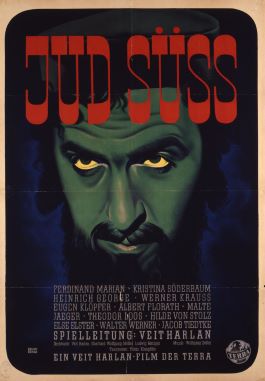
Jud Süß is a 1940 Nazi German historical drama and propaganda film produced by Terra Film at the behest of Joseph Goebbels. It is considered one of the most antisemitic films of all time. The film was directed by Veit Harlan, who wrote the screenplay with Eberhard Wolfgang Möller and Ludwig Metzger. The leading roles were played by Ferdinand Marian and Harlan's wife Kristina Söderbaum; Werner Krauss and Heinrich George played key supporting roles.
Joseph Peyré was a French writer. He won the Prix Goncourt in 1935 for Sang et Lumières.

Germaine Ribière was a French Catholic, member of the Résistance, who saved numerous Jews during World War II, and was recognized as a Righteous Among the Nations.
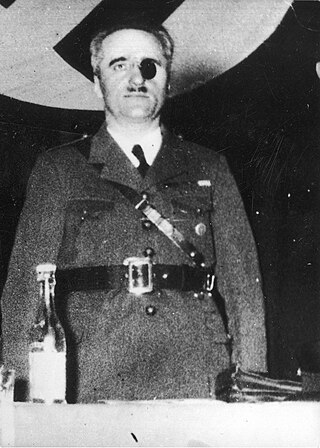
Jean Boissel was a French architect, journalist, and far right political activist who was convicted of collaboration with Nazi Germany during World War II.
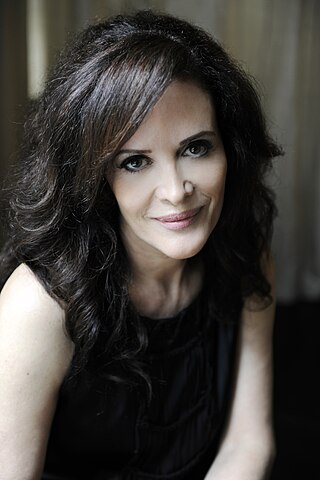
Daniella Ohad is an American-Israeli design historian, educator, writer, and influencer. She teaches history of design, material culture, design connoisseurship, and design culture at Parsons School of Design and New York School of Interior Design in New York City. Ohad has curated and moderated educational talks and panels at Design Miami, the Museum of Arts and Design, the Cooper Hewitt, Smithsonian Design Museum, 92nd Street Y, AIA New York | Center for Architecture, the New York School of Interior Design, and Sotheby's. Her articles and essays have been published in academic journals and magazines, she has hosted a talk show on design and architecture, created documentaries, and curated private design collections. Her essay Hotel Design in British Mandate Palestine: Modernism and the Zionist Vision received a special mention from the jury of the Premio Bruno Zevi in 2010.
Adriana Hunter is a British translator of French literature. She is known for translating over 60 French novels, such as Fear and Trembling by Amélie Nothomb or The Girl Who Played Go by Shan Sa. She has been short-listed for the Independent Foreign Fiction Prize twice. In 2011 she won the Scott Moncrieff Prize for her translation of Véronique Olmi's Beside the Sea. In 2013, she won the 27th Annual Translation Prize founded by the French-American Foundation and the Florence Gould Foundation for her translation of Electrico W by Hervé Le Tellier (2013). She is also a contributor to Words Without Borders. She lives in Kent, England. In 2017, she became the English translator for new comic albums in the Asterix series.
Ludwig Feuchtwanger was a German lawyer, lecturer and author.

Julien Courbet is a French journalist, television presenter and producer.

Marceline Loridan-Ivens was a French writer and film director. Her memoir But You Did Not Come Back details her time in Auschwitz-Birkenau. She was married to Joris Ivens.
The Pius War refer to debates over the legacy of Pope Pius XII and his actions during the Holocaust. The phrase was first coined in a 2004 book of the same name.
Élise "Lili" Garel was a French Jewish resistance fighter who, with her husband Georges Garel saved many Jewish children during the Shoah.
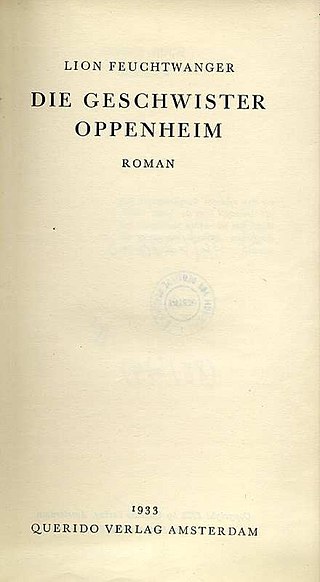
The Oppermanns is a 1933 novel by Lion Feuchtwanger. It is the second novel in his Wartesaal trilogy, which tells about the rise of Nazism in Germany; the first part of the trilogy is Success (1930) and the last is Exil (1940). In the same year when the novel was written, in 1933, the Nazis fully came into power, and the author published the novel already in exile.
References
- ↑ "Edgar Feuchtwanger: A Jewish childhood on Hitler's street". BBC News. 9 November 2012.
- ↑ "I Was Hitler's Neighbour". History Today . Retrieved 7 January 2013.
- ↑ "Home". maxgym.musin.de.
- ↑ "Former Jewish refugee recalls his neighbor from hell: Hitler". The Times of Israel .
- 1 2 Ghert-Z, Renee. "Hitler's Jewish neighbor lived under Nazis' noses, is now locked down in the UK". The Times of Israel. Retrieved 21 April 2020.
- ↑ "The Bloke who Lived Opposite Hitler". University of Southampton. 6 February 2014. Archived from the original on 5 May 2014. Retrieved 5 May 2014.
- ↑ "Edgar Feuchtwanger Aktuelle Autobiographie" (in German). Offizielles Portal zum Internationalen Lion Feuchtwanger-Jahr. Retrieved 5 May 2014.
- ↑ Lanchin, Mike (9 November 2012). "Edgar Feuchtwanger: A Jewish childhood on Hitler's street". BBC News . Retrieved 3 January 2013.
- ↑ "'Hitler, mon voisin: Souvenirs d'un enfant juif'". Éditions Michel Lafon, with Bertil Scali (in French). 2013.
- ↑ "Hitler, My Neighbor". Other Press. Other Press, with Bertil Scali. 2017.
- ↑ 'I was Hitler's Neighbour'. Bretwalda. 2015. ASIN 1910440000.
- ↑ "No. 63218". The London Gazette (Supplement). 31 December 2020. p. N11.